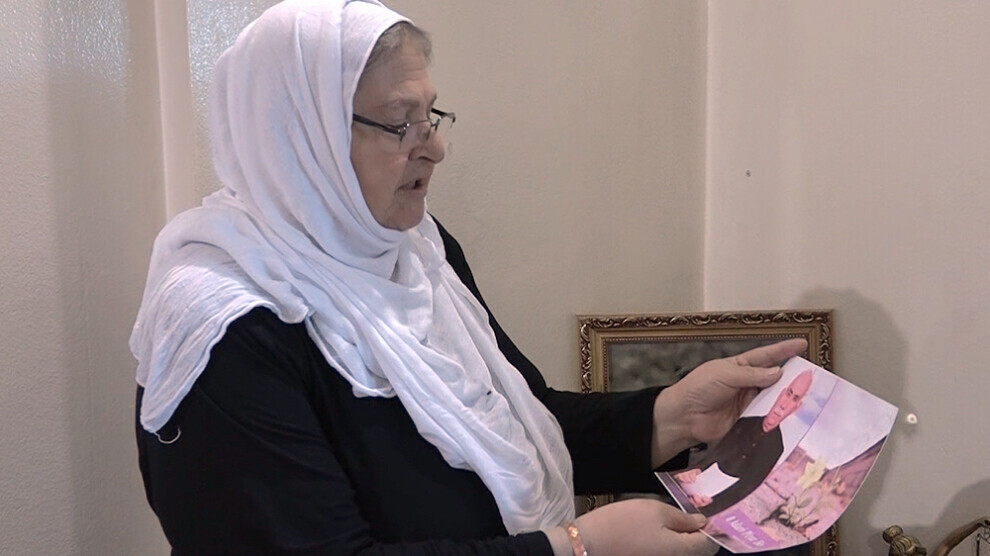Revolution’s Resilient Woman Nafya: I Will Fight Until We Free Our Leader
Dedicating her life to the struggle for freedom, Nafya Esad said, “I declare that I will fight until we free our Leader. At the same time, we will offer our strongest support to the SDF to defend our land and country, and not leave it to the occupiers.”

ZEYNEB ÎSA
Qamishlo – A life that began in the quiet streets of Qamishlo has, over the years, become one of the symbols of the freedom struggle. Nafya Esad is not only a mother; she is a woman who raised her children with the idea of resistance in a life woven with hardship, and who dedicated her existence to the ideal of freedom. Her story, which has unfolded since the 1980s, reveals how women and peoples in Rojava and North and East Syria created a foundation of resistance for the struggle for freedom.
She bcame a symbol of determination
Before the Rojava Revolution in North and East Syria, Kurdish patriots carried out their work with great devotion and secrecy. This quiet struggle was built over years of effort. With the start of the Rojava Revolution, this resistance reached its strongest point, especially under the leadership of revolutionary women. Nafya Esad was among these women; through her long struggle conducted in secrecy from the Damascus government, she became one of the symbols of determination on the road to freedom.
Recalling her first encounters with the Kurdish Freedom Movement, Nafya Esad said:
“At first, I didn’t know who the Apoists were. In 1984, our neighbors from North Kurdistan came to Rojava Kurdistan, and the wife of our neighbor spoke to me and my husband about the Apoists. We became close friends with them. Soon, guerrillas came to our house, and we talked a lot with them about the guerrillas. My husband loved the freedom movement. The freedom movement was for the liberation of oppressed peoples, and at that time we were facing the pressures of the Baath regime. We too were secretly carrying out our work and efforts to build a democratic society.”
‘We putup great resistance’
Nafya Esad, who carried out front-line work for more than ten years, continued:
“After we started working, we visited houses in the Xerbî neighborhood. We introduced the movement and the guerrillas to the people in their homes. Our first march was on May 1st in Qamishlo. We put up great resistance there. My family and my husband also faced many challenges. People would say, ‘Who are these people, why are you working with them? You could be arrested by the regime for working with them.’ But despite all these words and difficulties, we did not give up and continued our work. We are still carrying out home visits. I myself carried out front-line work for ten years. Later, our house became well-known among the people. We moved from Xerbî neighborhood to Kornîş neighborhood, and we continued our work there as well.”
‘I am always working’
Explaining that they accomplished much with their work, Nafya Esad said:
“Many people joined us and worked side by side with us, and many successful achievements were made. In the early 1990s, a group of people said they would go to meet Leader Apo. I prepared myself to go meet Leader Apo. A week later, we went to see him and spent a week in training. I told Leader Apo that we could go to the free mountains, and he asked if we had children. I said yes. He told us that we should raise our children with revolutionary ideas. He said that raising our children with revolutionary ideas and organizing women was itself a sacred task. Ever since Leader Apo told me this, I have been constantly working to organize women and raise my children with revolutionary ideas. We continued our work until the Rojava Revolution began.”
‘I will never leave the organization’
Nafya Esad stated that after the Rojava Revolution began, she worked for nine years in the Reconciliation Committee of the Women’s House (Mala Jin). She concluded her words by saying:
“After women took the lead in the Rojava Revolution, I worked for nine years in the Women’s House Reconciliation Committee. I will never leave the organization. As a martyr’s mother, I declare that I will fight to the end until we free our Leader. At the same time, we will offer our strongest support to the SDF to defend our land and country, and not leave it to the occupiers.”
